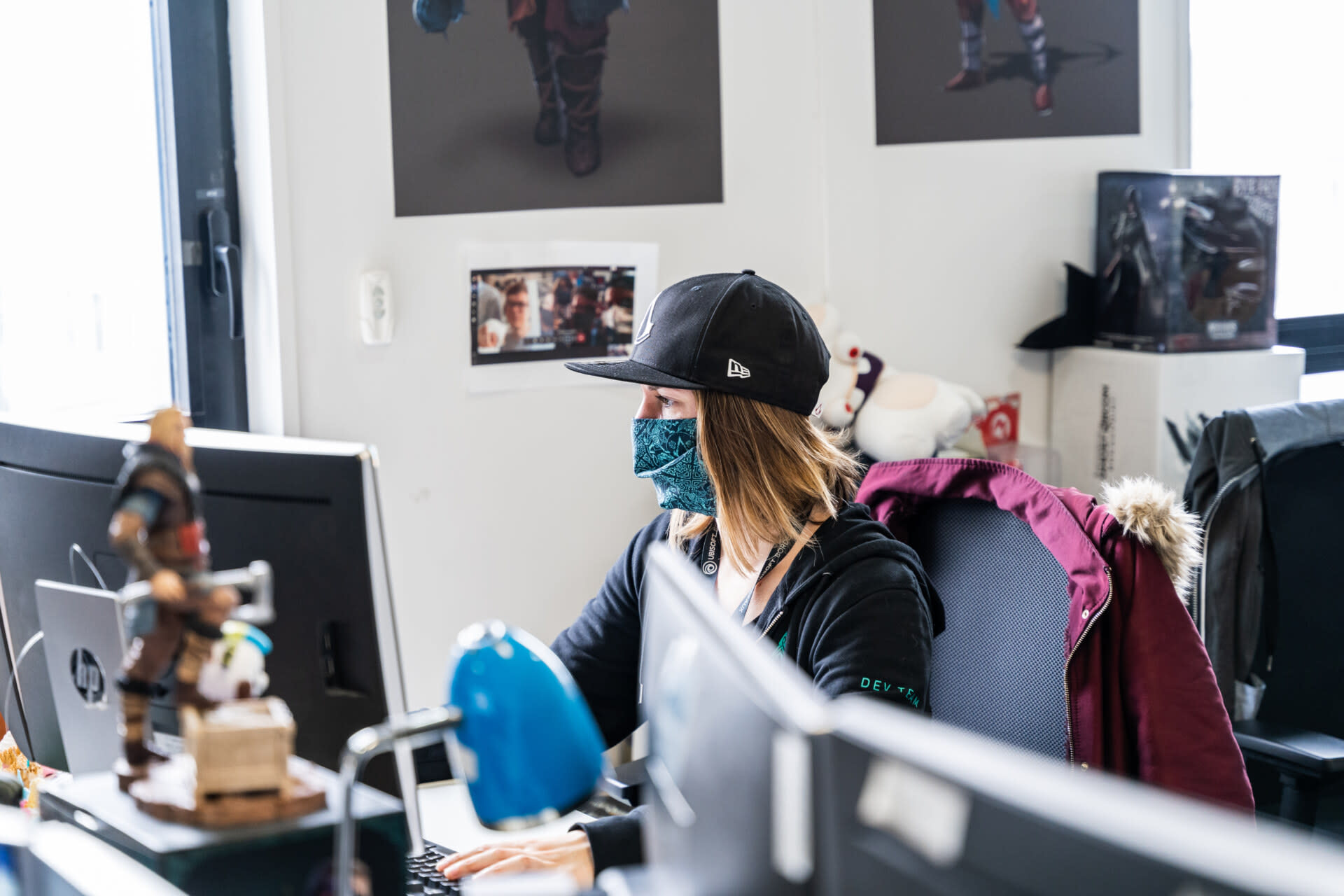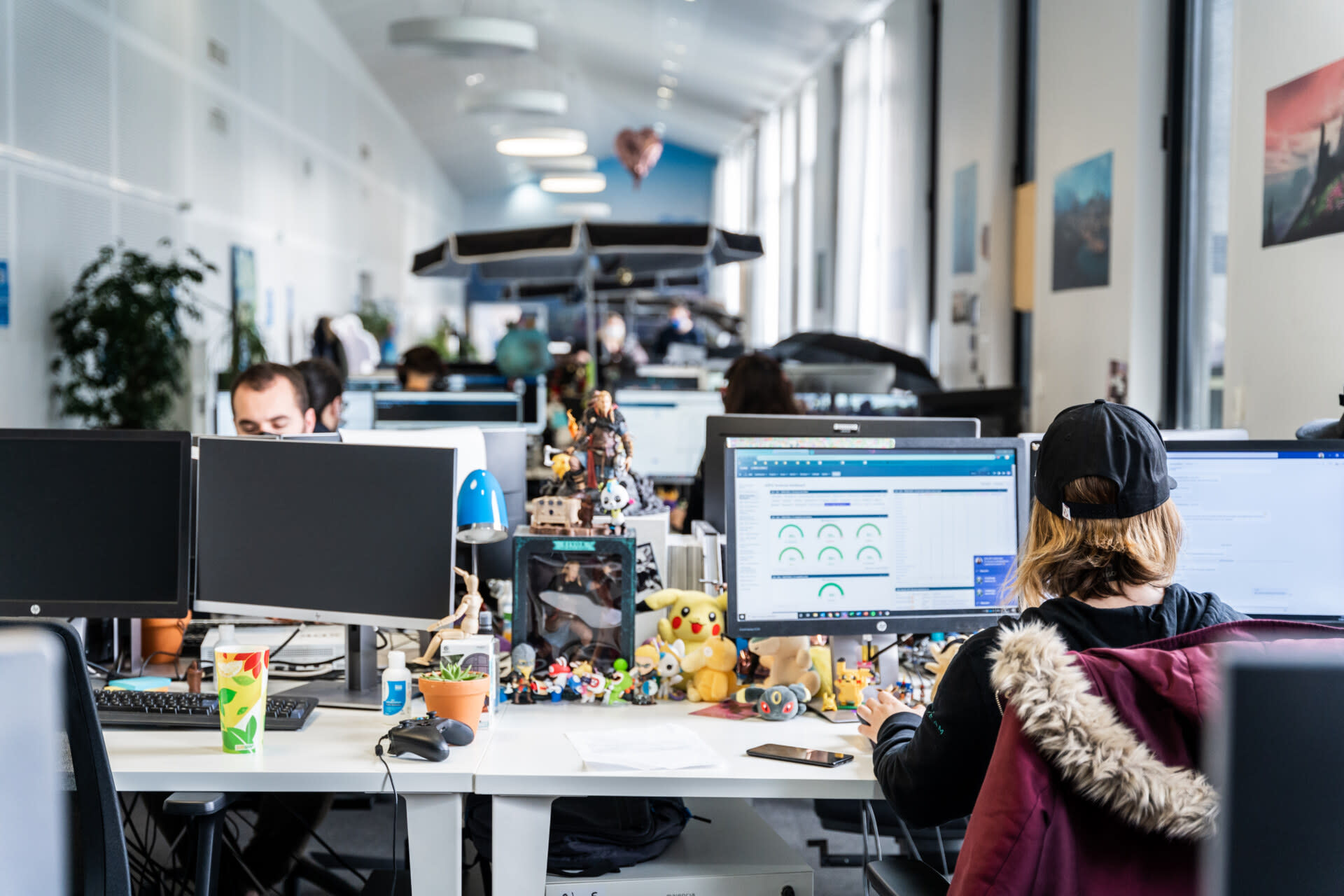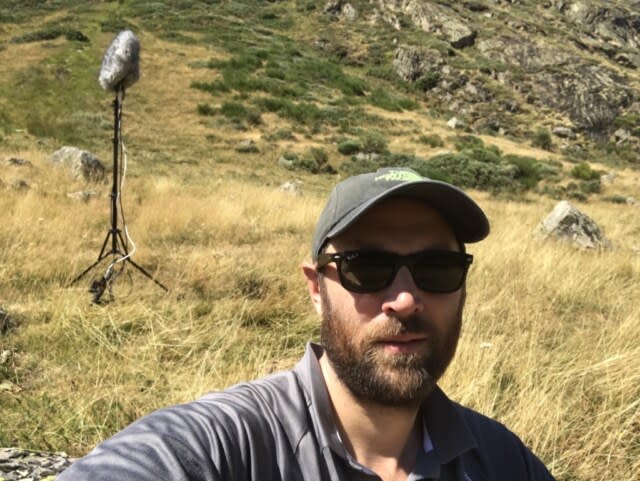Etienne Marque has been leading the audio team at Ubisoft Bordeaux Studio since May 2019. He talks about his work and the projects he's been working on with his team, including the latest one: creating the audio for the new Assassin's Creed Valhalla expansion which is scheduled for release on May 13 and entitled Wrath of the Druids.
At 35 years old, Etienne is Lead Audio at Ubisoft Bordeaux. After film school, specializing in sound work, he started at ENJMIN for a master's degree in video games. After starting his career as a Sound Designer, he joined Ubisoft in 2019.
What he likes: Hiking in nature
What he doesn’t like: Anything that is too complex for no reason
YOU STARTED YOUR STUDIES WITH A DEGREE IN CINEMA, SPECIALIZED IN AUDIO. WHAT DO YOU PARTICULARLY LIKE ABOUT THE SOUND IN MOVIES?
E. M. - I grew up in a house where we listened to a lot of music, and I've always loved working with the imagination, listening to and telling stories. So, I naturally fell in love with cinema when I was growing up, and I soon wanted to work in this field. I find it easier to convey an emotion, to tell a story with sounds rather than with writing or speaking. So, I went to film school, specializing in sound work. That's when I discovered the joy of post-production, getting images to create sounds that bring something to the scene.
AND FINALLY, WHAT BROUGHT YOU TO VIDEO GAMES?
E. M. - At the end of my school, I realized that the world of cinema was very difficult to access. I was relatively young, and I didn't feel mature enough to enter the working world yet. I wanted to continue my specialization, and while talking with friends, I discovered ENJMIN, which is specialized in interactive media, and therefore video games. It was intriguing for me, because sound work is really different because of this interactivity. So, I did a master's degree there, then I found a job that bridged the gap between my two degrees, with both video game projects and animation series projects. I continued to work as a Sound Designer in different companies, and for two years now, I have been Lead Audio at Ubisoft Bordeaux.


WHAT ARE THE DIFFERENCES BETWEEN SOUND WORK IN CINEMA AND SOUND WORK IN A VIDEO GAME?
E. M. - Even if there are many similarities in the tools used or the way sounds are processed, the main difference logically concerns interactivity. In a linear medium, such as film, the sounds are placed in the image, and we know that they will always intervene at a precise moment determined in advance. For a game, we work in the realm of possibilities, imagining and anticipating what might happen. Because it is the player, even if he is guided, who controls the environment, and therefore the sound environment. Let's take the example of a door that the player opens to go outside. We have to anticipate the sound that will correspond to the way he will decide to open it: At what speed? Is it a creaky door? What outside noises will occur? Do cars pass by on the street? All these sound sources must be treated independently of each other to integrate them in a functional and coherent way.
A lot of know-how comes from cinema, and in fact, we see more and more games treated as interactive films. This implies that there are cultural codes specific to this art that can be found in video games. When you see a game that looks like a movie, you logically expect to see a sound similar to what you would find in a movie. The impact is there. But video games also have more and more influence on cinema, if only in terms of technology for example.
AS AN AUDIO LEAD, WHAT IS YOUR ROLE IN THE BORDEAUX STUDIO?
E. M. - In the video game industry, on a daily basis, the Lead is a bit like the conductor of the game's audio team. And at Ubisoft Bordeaux, we have Sound Designers, Technical Designers and Voice Designers on the team. Sound Designers work on the creation and integration of sounds, whether they are environmental, special effects, or foley (the noises linked to the character's movements). Technical Designers have a very advanced knowledge of sound integration tools and focus on the technical part (setting up systems, tools, etc.). And Voice Designers work on voices, human but not only. My job is to supervise these different specialties, to understand their needs and those of the other teams, and to support them as best I can. I make sure that we are all going in the right direction, that we all agree on it, and that we have all the means necessary to get there. And from time to time, I make sound too!
WHEN YOU CAME INTO THE BUSINESS, DID YOU EXPECT TO WORK WITH SO MANY DIFFERENT PROFESSIONS AND TECHNIQUES?
E. M. - It's true that we're involved in everything, from animation to the interface, as well as narration, atmospheres, etc. And this requires us to understand the workings and constraints of each profession involved in the production of a game. Going back to the example of the door that opens, we have to understand how it works technically in order to assign the right series of sounds to it. There is a whole reflection behind this kind of work that is very interesting and that made me switch to video games when I chose my major. It's exciting to find the right sound for the right movement, at the right time.

“In this photo, I was hiking. Sound is a passion first and foremost, as well being my job. I record every day: if it makes sound, I record it. I like to use the vegetable garden analogy. It's always more fun to cook your own vegetables. The same goes for sound. If you’ve recorded it, it is simpler straight away. You know the sounds, you remember the day you recorded it, and what you felt and thought during the session.”
THERE IS A PHRASE THAT YOU SHARED WITH US THAT WE WOULD LIKE YOU TO EXPLAIN IN MORE DETAIL. YOU SAID THAT IF THE SOUND DESIGN OF A GAME IS GOOD, THE PLAYER DOESN'T NOTICE IT. WHY?
E. M. - “Here, in this instance, it's like in the movies. Ben Burtt, the Star Wars sound designer, used to say about his work: “the most important thing you can do as a sound designer is to make the right choice for the right sound at the right moment.” I like this quote a lot because we tend to want to make things very complicated, by adding a whole bunch of sounds, by transforming them, etc. But sometimes all it takes is a very simple sound in the right place. It's really the most complicated work in video games at that level: you have to determine the need and know if what you're doing adds something to the narrative and the gameplay.
And if the sound is good, it means that you accept the world you are moving through, and therefore you do not pay attention to what you hear anymore. Whereas if a sound is poorly placed, the player will immediately notice it, it will sound wrong, and the desired effect will have failed. It must seem logical to hear a ship passing overhead if you live in a science fiction universe. And Ben Burtt's work was incredible in that respect: a laser gun sound today, we all know what that sounds like.”
WITH YOUR TEAM, YOU TOOK ON THE SOUND WORK FOR EXPANSION 1 FOR ASSASSIN'S CREED VALHALLA, “WRATH OF THE DRUIDS”. HOW DID THE PROJECT TO EXPAND THE ORIGINAL GAME GO?
E. M. - It was like adding a chapter to a story. We had to understand the world that already existed, what the rules were that govern it, and build our work from the directions chosen by the game's audio director, who is based in Montreal. We had already worked a bit on the main game, but the franchise was a new challenge for the teams overall. So, a lot of time was spent learning how the sound data and the systems already implemented worked. We then created our own sounds, related to the expansion and the story it tells. And of course, there were several challenges: the time we had, the need to work with the tools we had, and the overall size of the expansion. It was essential to take into account the size of the expansion and the memory space available to us. Adding sounds had to be done without jeopardizing the balance of the game.
HOW DID THIS WORK GO DURING THE PANDEMIC?
E. M. - We worked almost essentially remotely. There were positives and negatives, as with everyone. The negative aspect was being away from the teams, which is a shame because you really need to interact, attend meetings, go and ask a colleague a question at his or her desk. It's a very lively job, where the human element is essential. Another big problem we had was the desynchronization between audio and video. As we work on our computers remotely, there is a latency that could go up to several seconds. And when you're trying to put down the sound of a sword being drawn, it was sometimes hard to know if it was properly timed to the movement. To make sure that the timing was right, we went back to the office, organizing it of course so that we respected the health and safety rules in force.
On the plus side, I must admit that working from home offers a much quieter environment. Provided, of course, that you have a work environment that allows it. But for people like us, it's really nice to work with speakers instead of headphones. Working remotely also drove us to communicate more, I would say. We've created more opportunities to talk together, and that's a real positive. In the end, we really found a balance between working remotely and working in the office.
WHAT ADVICE WOULD YOU GIVE TO STUDENTS GOING INTO SOUND WORK IN THE VIDEO GAME INDUSTRY?
E. M. - In fact, I talk a lot about technique, and that's important and interesting from an intellectual point of view, but it's not the most important thing. Because you can always learn to use the tools. For me, you have to ask yourself what you want to be heard, you have to work on your listening skills. When watching a movie or exploring a video game, you have to pay close attention to the audio and ask yourself why this or that sound works or not. Then try to reproduce this sequence yourself to practice, by going outside to pick up sounds, by testing things. And don't focus only on audio: you have to be interested in all the professions and ask yourself questions all the time. Why does my door, to use the example again, creak? Why does it make this sound and not that one? What counts is working on your ear, feeding your passion, and listening consciously to your environment.